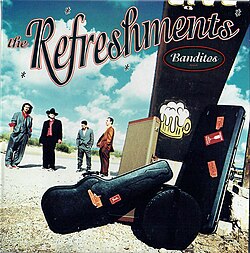
Stone Temple Pilots’ “Interstate Love Song” stands as one of the defining tracks of 1990s alternative rock, a song that balances melody, grit, and emotional intensity with masterful precision. Released in 1994 on their second album, Purple, it captures the tension, introspection, and raw honesty that characterized much of the grunge and post-grunge movement while showcasing Stone Temple Pilots’ unique ability to fuse alternative rock sensibilities with classic rock influences. Over the decades, “Interstate Love Song” has endured not only as a fan favorite but as a symbol of the band’s musical prowess and emotional resonance.
From its first guitar riff to the closing vocal line, the song exudes both energy and vulnerability. Unlike the abrasive aggression that defined some of the era’s grunge hits, “Interstate Love Song” is melodic and polished, yet still carries the weight of emotional honesty and inner conflict. Its enduring appeal lies in the way it combines sonic accessibility with lyrical complexity, resulting in a track that is immediately engaging while also rewarding deeper analysis.
Stone Temple Pilots and the 1990s Alternative Rock Scene
By 1994, Stone Temple Pilots (STP) were already established as one of the most prominent alternative rock bands in the United States. Their debut album, Core, had been a commercial success, delivering hits like “Plush” and “Creep” and cementing their place in the grunge and post-grunge movement. However, the band faced intense scrutiny from critics, some of whom accused them of mimicking the sounds of Nirvana and Pearl Jam.
Purple, their sophomore effort, was a pivotal moment for the band, allowing them to refine their sound and assert their identity. “Interstate Love Song” emerged as the standout track, demonstrating STP’s ability to craft complex, emotionally resonant rock songs while maintaining broad commercial appeal. Unlike the rawer tracks on Core, this song combined intricate guitar work, rhythmic sophistication, and introspective lyrics to create a sound that was both polished and emotionally charged.
Inspiration and Lyrical Themes
“Interstate Love Song” is notable for its autobiographical underpinnings. Written primarily by frontman Scott Weiland, the lyrics reflect themes of deceit, confession, and emotional conflict. Weiland’s own struggles with honesty in relationships—especially amid personal and professional turmoil—inform the song’s narrative, giving it a sense of authenticity that resonates deeply with listeners.
The song’s central theme revolves around the tension between outward appearances and inner truths. Lines like:
“Waiting on a Sunday afternoon
For what I read between the lines
Your lies”
capture the anxiety and guilt associated with concealment and deception, while the chorus conveys the push-and-pull of emotional vulnerability and self-protection. This duality—of confession and deflection—creates a narrative complexity that elevates the song above conventional love songs or rock singles of the era.
Musical Composition and Guitar Work
Musically, “Interstate Love Song” is a testament to STP’s ability to blend technical skill with accessible rock sensibilities. Guitarist Dean DeLeo employs a combination of clean, twangy riffs and layered chord progressions that evoke both country-rock influences and classic rock textures. The main riff is immediately recognizable, with its smooth, flowing lines creating a sense of movement that mirrors the song’s lyrical imagery of travel, journeys, and evasion.
The song’s structure is deceptively intricate. It opens with a clean, arpeggiated riff before transitioning into a more aggressive, driving verse, creating dynamic tension that mirrors the lyrical conflict. DeLeo’s solos are tasteful and melodic rather than flashy, enhancing the song’s emotional impact without overwhelming it. This careful attention to tonal balance and melodic phrasing is one of the reasons the track has endured as a hallmark of 1990s alternative rock.
Rhythm Section and Sonic Texture
Bassist Robert DeLeo and drummer Eric Kretz provide a foundation that is both tight and fluid, giving “Interstate Love Song” its rhythmic propulsion. The bass line, while understated, anchors the melody and reinforces the song’s sense of motion. Meanwhile, Kretz’s drumming alternates between restrained backbeat patterns and more assertive fills, emphasizing key moments in the song and complementing Weiland’s vocal phrasing.
This interplay between rhythm, melody, and dynamics contributes to the track’s sense of journey and momentum. The musical arrangement evokes the literal imagery of a highway drive—consistent, forward-moving, yet punctuated by moments of tension and release. This sonic metaphor enhances the lyrical themes, creating a cohesive artistic vision that resonates on multiple levels.
Vocal Delivery and Emotional Resonance
Scott Weiland’s vocal performance is central to the song’s impact. His voice oscillates between cool detachment and raw vulnerability, reflecting the inner conflict embedded in the lyrics. He employs subtle inflections and dynamic shifts to convey guilt, longing, and tension, creating a performance that feels simultaneously confessional and theatrical.
Weiland’s delivery in the chorus—rich, melodic, and slightly yearning—contrasts with the tighter, more restrained verses. This dynamic interplay mirrors the lyrical themes of concealment and confession, highlighting the emotional complexity that has made the song so compelling. His vocal phrasing, combined with the layered harmonies in the background, enhances the sense of movement and emotional urgency throughout the track.
Cultural Impact and Reception
Upon its release, “Interstate Love Song” became one of Stone Temple Pilots’ most commercially successful tracks. It reached number one on the Billboard Album Rock Tracks chart and received heavy airplay on both alternative and mainstream rock radio. Its success helped cement STP’s reputation as one of the leading alternative rock bands of the 1990s, bridging the gap between grunge influences and a more melodic, radio-friendly approach.
Critics praised the song for its combination of accessible melodies, sophisticated guitar work, and lyrical depth. Over time, it has been recognized as one of the defining tracks of the decade, appearing on numerous “best of the 1990s” lists and being frequently covered or referenced by other artists. Its enduring appeal lies in its ability to balance complexity and immediacy, offering both casual listeners and devoted fans a rich, rewarding musical experience.
Live Performances and Legacy
“Interstate Love Song” has remained a staple of Stone Temple Pilots’ live shows. Its driving rhythm and singable chorus make it a highlight for audiences, while the band’s dynamic performance emphasizes the song’s tension and release. Over the years, various live versions have showcased subtle variations in instrumentation and vocal delivery, demonstrating the track’s flexibility and resilience.
The song’s legacy extends beyond live performance. It has been featured in films, television series, and video games, introducing new generations to its melodic hooks and emotional depth. Musicians and critics alike cite it as a masterclass in combining lyrical introspection with musical accessibility, influencing countless alternative rock and post-grunge acts in the decades that followed.
Why ‘Interstate Love Song’ Endures
The timelessness of “Interstate Love Song” can be attributed to its multifaceted strengths. Its lyrical honesty, melodic sophistication, and emotional depth create a track that resonates with listeners on multiple levels. Unlike more ephemeral pop hits, it balances introspection and accessibility, allowing it to appeal to both casual listeners and devoted fans.
Musically, the song’s combination of tight rhythmic interplay, expressive guitar work, and dynamic vocals ensures that it remains engaging even decades after its release. Its metaphorical depiction of travel and emotional turbulence gives it universality, allowing listeners to project their own experiences onto the track. These qualities have allowed “Interstate Love Song” to endure as a classic of 1990s rock and a touchstone for alternative and post-grunge music.
Conclusion: A Highway Through Emotion and Sound
Stone Temple Pilots’ “Interstate Love Song” is more than a hit single; it is a sonic journey through conflict, emotion, and self-realization. Its intricate guitar lines, dynamic rhythm section, and evocative vocals combine to create a track that is both musically compelling and emotionally resonant. The song’s success lies in its ability to balance technical skill with accessibility, melancholy with melody, and honesty with performance.
Decades after its release, “Interstate Love Song” continues to captivate listeners, serving as both a defining moment in Stone Temple Pilots’ career and a testament to the enduring power of 1990s alternative rock. Its exploration of personal conflict, emotional tension, and the inevitability of human imperfection ensures that it remains relevant, meaningful, and deeply affecting.
Ultimately, “Interstate Love Song” is a reminder that music can simultaneously entertain and provoke reflection, offering both a compelling auditory experience and a window into the human psyche. Its place in the rock canon is secure, a track that captures the essence of its era while transcending time through melody, emotion, and storytelling.
“Interstate Love Song” is a journey—one that rolls through emotional landscapes, navigates the highways of introspection, and leaves listeners both exhilarated and contemplative, a true testament to Stone Temple Pilots’ artistry.


